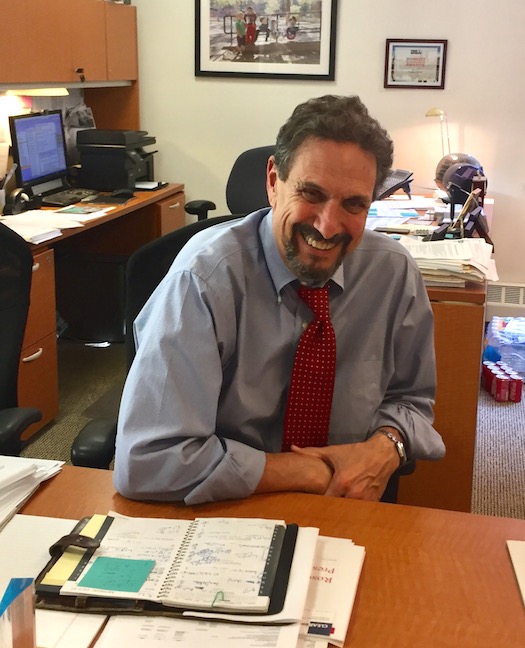
By Carol Tannenhauser
Stephan Russo remembers his first staff meeting at Goddard Riverside Community Center. It was 1976 and he was 25 years old, not the executive director of the revered Upper West Side social service organization as he has been since 1998, but a newly hired youth worker in a delinquency prevention program.
“There was staff from the community, Latino staff, Black staff, women staff, and me, a bright-eyed, Ivy-League, white guy,” he said, in a recent interview in his office at Goddard Riverside on Columbus Avenue and 88th Street. “I said, ‘This will be easy. We’ll recruit kids, go to the park, get to know them, run a basketball league.’ People said, ‘No, I don’t think that’s it. What’s going on in this neighborhood? Why are kids hanging out and getting into trouble? Did you know that so-and-so lives alone with his mother who’s an alcoholic and there’s a group of kids squatting in a brownstone on 92nd street?’ We began to discuss the socioeconomic issues of the neighborhood: jobs, education, housing. I said, ‘This is going to be a little more complicated than I thought.’”
Russo was prepared for the challenge. After graduating from Brown University, where he was an All-Ivy, All-American lacrosse attackman (who said he can’t tell you what he had for breakfast, but remembers every detail of an “outstanding” game he played in 1971), he joined the Peace Corps.
“Ten days after my last lacrosse game I was on a plane to Bogota, Colombia,” he said. “I had no skills other than athletics, so they assigned me to a Colombian sports agency.
“They’d send me out to rural villages. I’d get off the bus with a bag full of volleyballs and basketballs, walk up to the priest’s house and say ‘I’m here.’ He’d say ‘Who sent you?’ I’d tell him and ask, ‘Aren’t I supposed to be here?’ He’d say, ‘I don’t know.’ I’d say, ‘Well, can you put me up? I’ve got these volleyballs and basketballs…’
“Those skills that I learned at 22: figuring out how to enter somebody else’s space and be helpful, developing credibility and relationships, were the same skills I employed on the streets here, and, 40 years later, we still do. That’s how you build community.” This is a core belief of “settlement houses,” Russo explained, Goddard Riverside being one of the oldest in the city, dating back to the late 1800s. “Go to where the clients are, enter into their life spaces, figure out their needs and how to help them, create programs.”
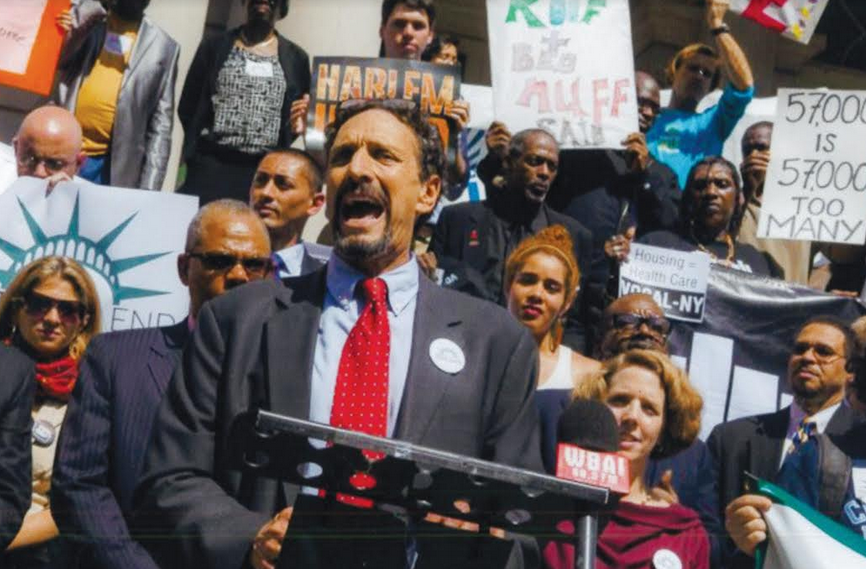
Russo speaking at an affordable housing rally.
Goddard Riverside currently offers 26 cradle-to-grave programs in 21 locations, from childcare and early childhood education, to recreation, tutoring, arts and culture, college access, legal services, mental health, and jobs programs, to senior centers, housing, and communal and home-delivered meals. It also sends out “street outreach teams” to build relationships with homeless people throughout Manhattan, with the hope of bringing them into permanent supportive housing, including four such residences built by the organization (see Capitol Hall.) Russo is a passionate and vocal advocate for outreach and affordable, supportive housing, which he believes are the long-term solutions to homelessness. “We’ve taken about 3,000 people off the streets permanently in the past six or seven years,” he said.
Goddard Riverside is programmatically and financially sound – stellar, some might say – and a strategic plan for its future is in place. What better time, Russo reasoned, to retire? He will step down at the end of this year. Goddard Riverside’s board of directors has conducted an extensive search and narrowed it down to three finalists.
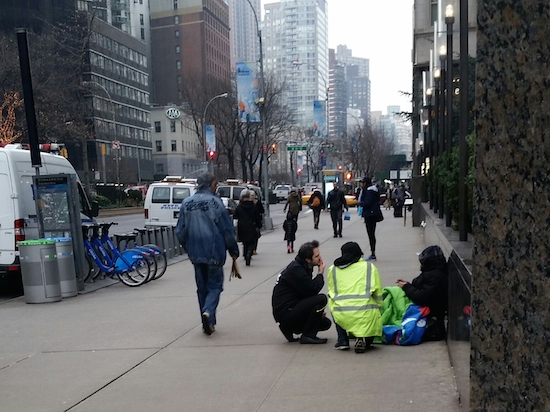
Goddard outreach workers speak with a homeless person.
“Everybody thinks I have some hidden plan, that I know what I’m going to do, but am not telling,” Russo laughed. Does he? “No. I just realized that this is my 40th year at Goddard and I’m 65. It’s important to think about the future and empower the board and a new generation of leadership. And you know what? I’m still active and I really want to see if there’s another chapter. In some ways, it’s a bit of a personal risk. It’s not easy giving this up.
“At the end of the day, I was just a temporary steward here,” Russo concluded. “Goddard Riverside, this venerable community institution, is more than just one person or a series of programs. It’s an idea about how we want to create a better world. How lucky am I to have had this job for so many years?”
Support Goddard programs by stopping by its book fair this weekend:
GODDARD RIVERSIDE BOOK FAIR
Nov. 19-20, 10 a.m – 5 p.m.
Goddard Riverside Community Center
593 Columbus Ave at 88th St.
212-873-6600
The result of a 30-year partnership with the publishing community, the Goddard Riverside Book Fair will feature brand-new bestsellers at 50 percent off. Proceeds support Goddard Riverside’s anti-homelessness and anti-poverty programs.



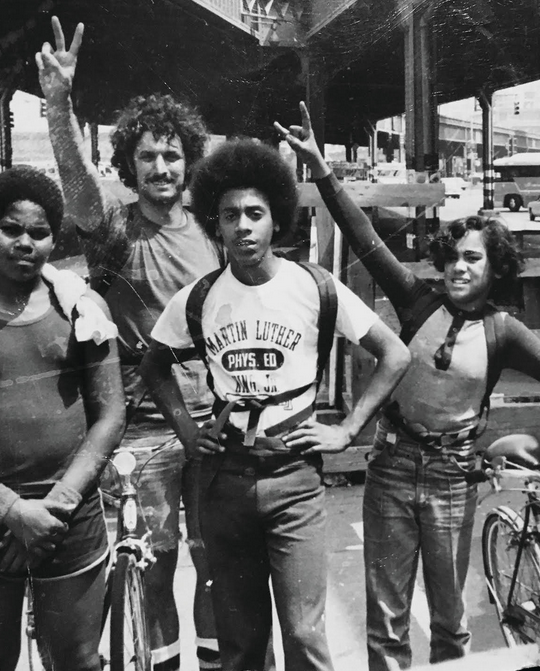
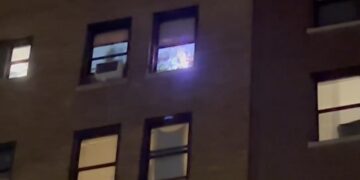


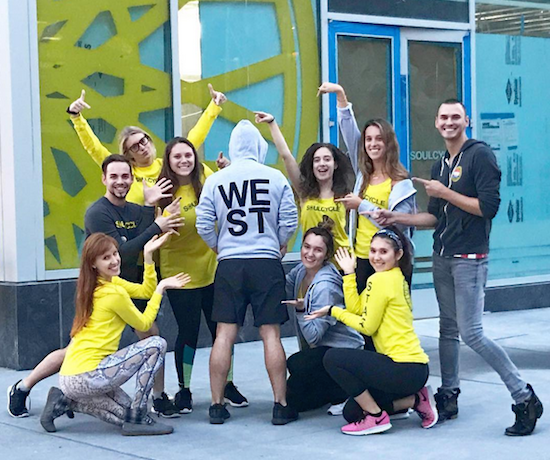
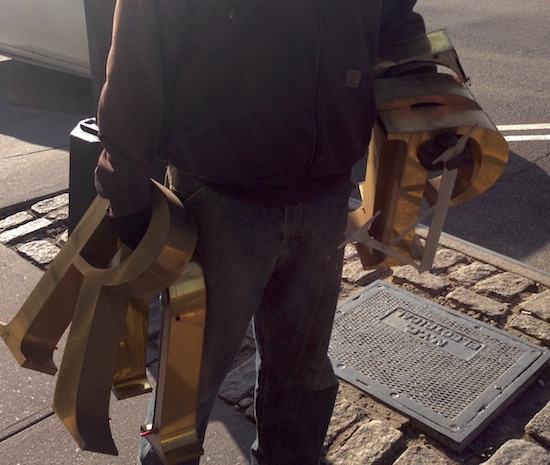
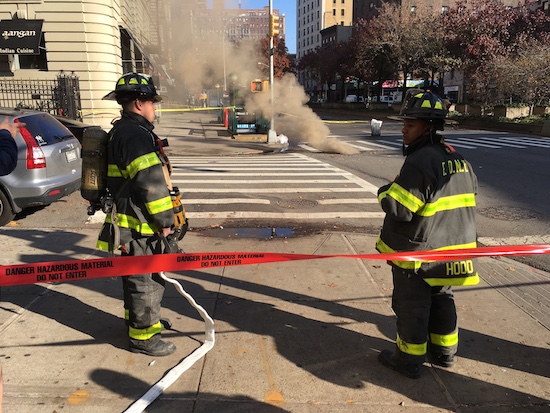
Russo asks “How lucky am I to have had this job for so many years?” I ask “How lucky is Goddard Riverside and NYC to have had Stephan Russo for so many years?” A model for us all. Thanks for the article, WSR, it helps restore faith in humanity.
I like him, he is good man.
One of the most important phrases in this article was “cradle to grave.” Many participants started in the youth programs, college prep, internships, arts classes, and now use the senior center. They are active, social men and women. I hope the future generations of the Upper West Side (and all New York and beyond) will get off their cell phones and be a part of their community! When you give your time, you get back so much more.
Sounds like a great man. And a great article, Carol.